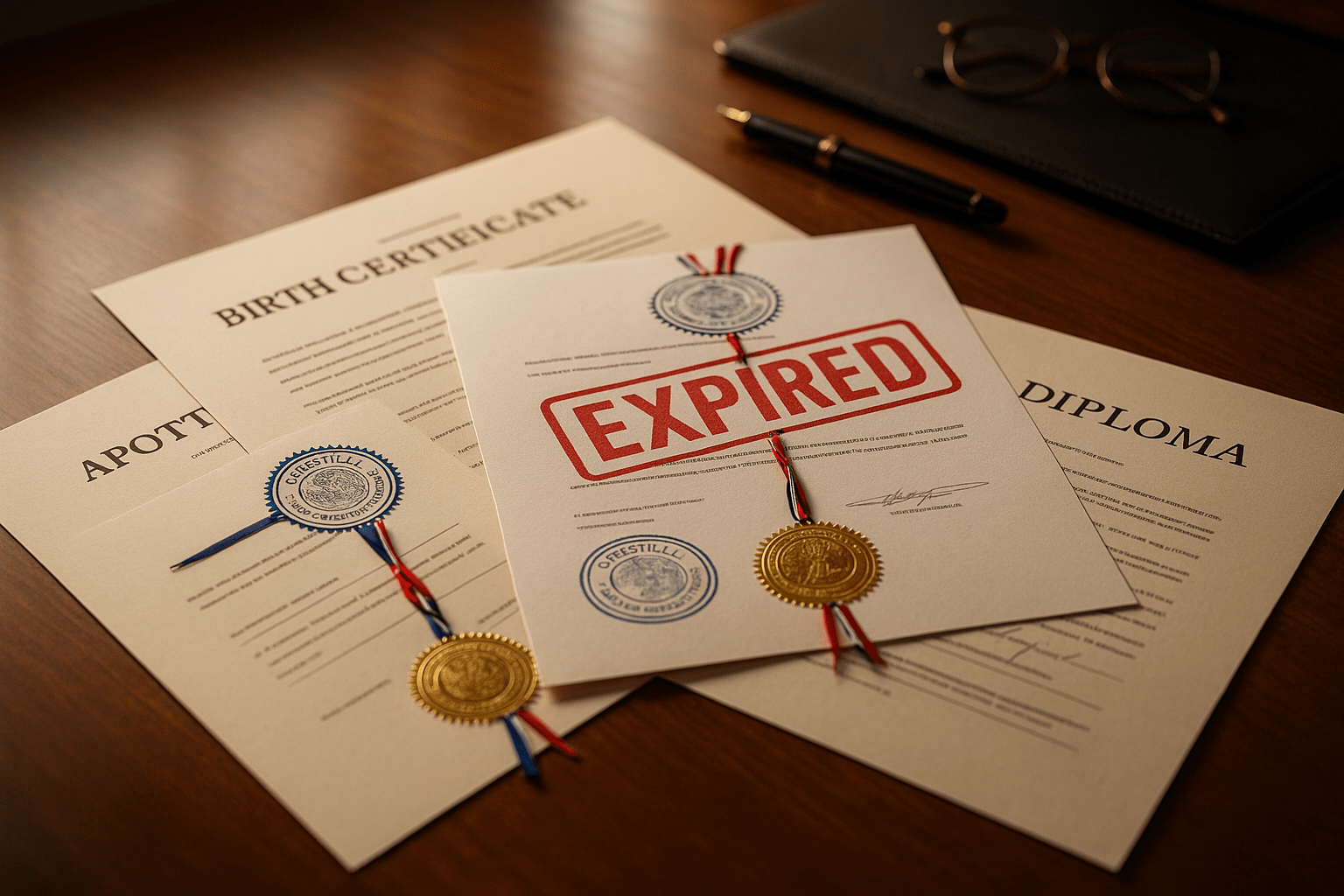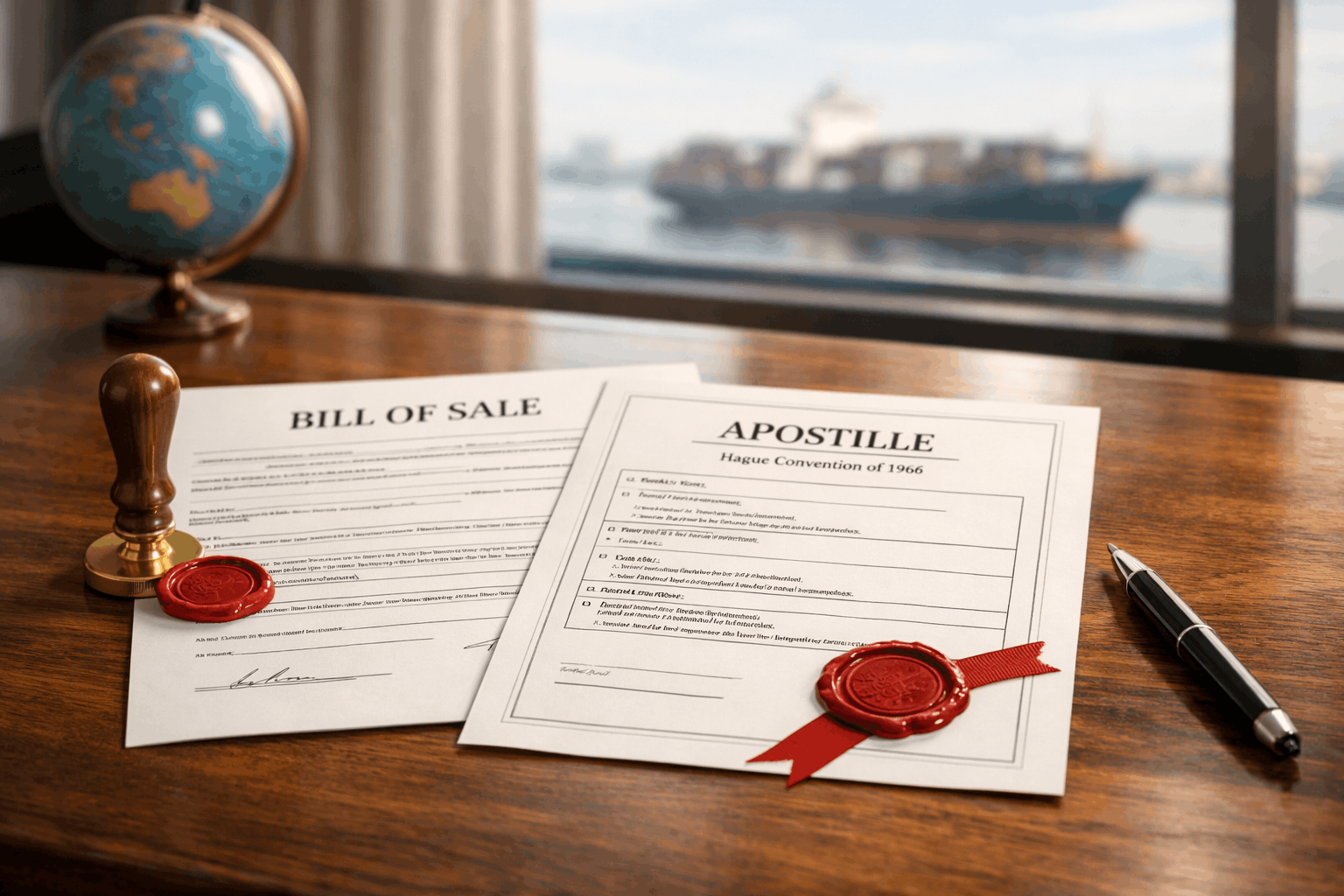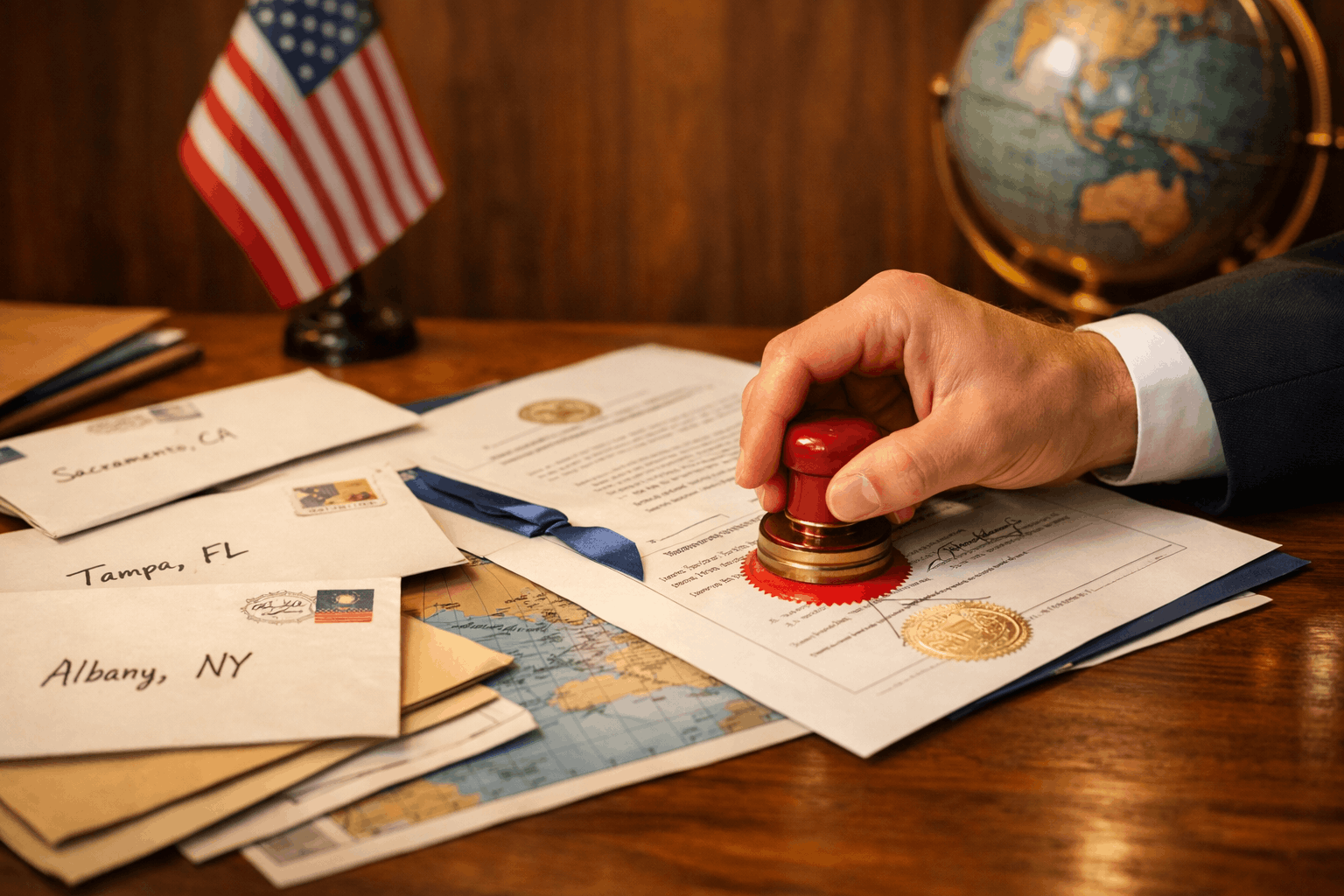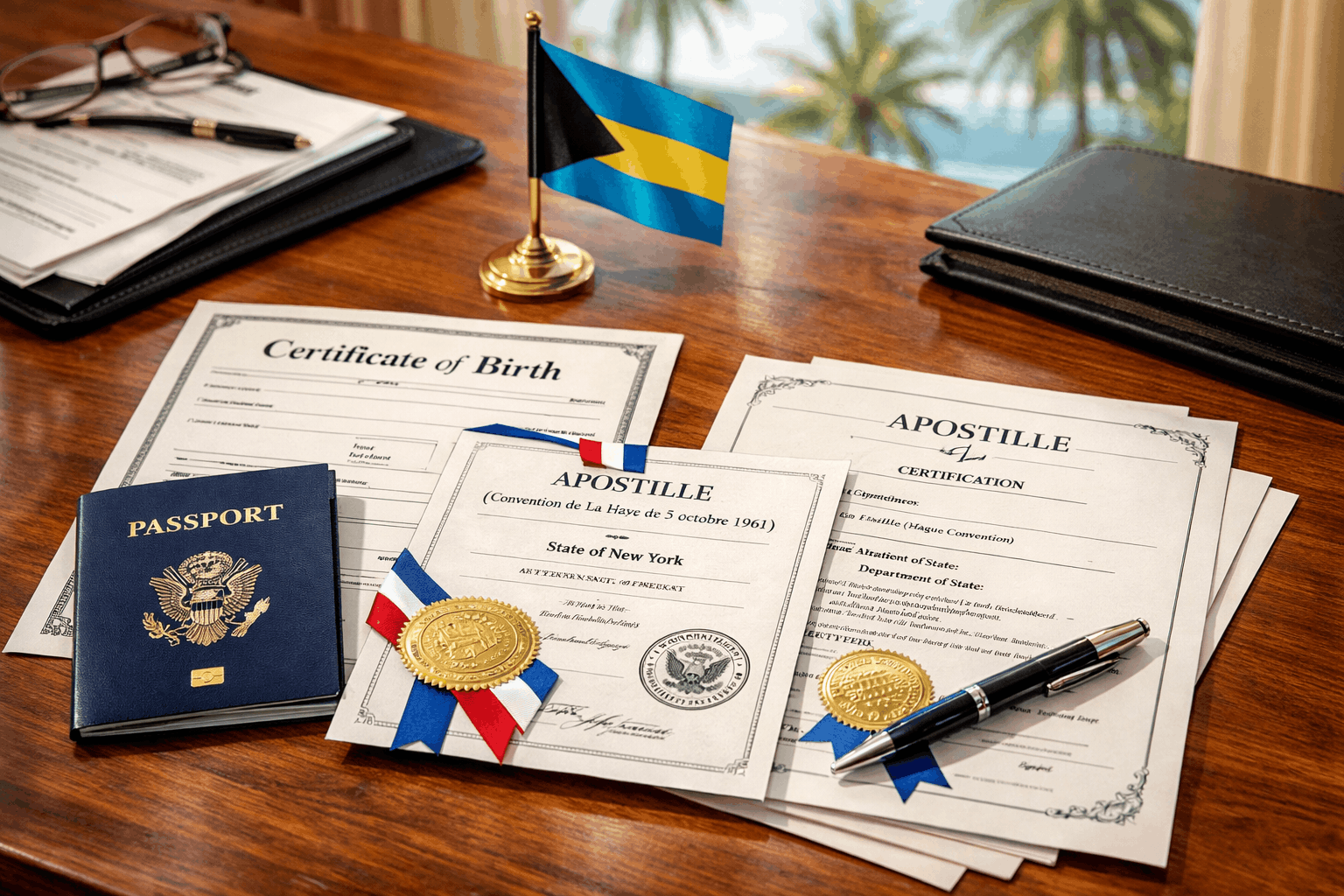
How Long Does the Apostille Last?
Have you ever wondered if your current apostille is still good to go or if you need a fresh one? The great news is we got the answer for you in this post. Questions like “Do apostilles expire?” appear regularly during document authentication discussions, but confusion persists. That’s why today, we’ll explore the lifespan and what determines apostille validity, helping you avoid unfavorable surprises when presenting your apostilled paperwork abroad.
Key Facts at a Glance
Let’s lay out the essentials before diving into more details. Apostilled document’s validity isn’t just about the stamp but about the underlying record it’s affixed to. Knowing whether that apostille you obtained years ago remains usable or not begins with evaluating the crucial points below.
Does an Apostille Expire?
An apostille doesn’t come with an expiration date. From the moment it’s issued, the certification is legally valid as long as the underlying document is accepted in the destination country. Think of it as a one-time verification that the signatures and seals on your papers are genuine, and even with time, this fact doesn’t change.
Why the Underlying Document’s Validity Matters
The apostille validity period directly ties to the lifespan of the document itself. For instance, a birth certificate is valid indefinitely, making the apostille attached to it permanent as well. Conversely, if the base document expires or falls out of use, such as a notarized commercial contract, its apostille also loses practical value. In short, the validity of your certification is dictated by the document’s nature.
Understanding the Duration of an Apostille — Do Apostilles Expire?
Though the basics are technically straightforward, the answer to your apostille’s longevity is still more delicate than a simple yes or no, right? This section will break down the practical context to offer a complete picture.
The Principle of Indefinite Validity
An apostille doesn’t expire by design and is supposed to remain effective indefinitely under the Hague Convention. Since its purpose is to authenticate your document at the point of issuance, this specific act of verification is considered a historical, unalterable fact. Hence, once an apostille is applied to the paperwork, it stays valid forever.
Why Acceptance May Still Depend on Document Freshness
Despite the apostille’s indefinite validity, many foreign authorities require you to submit recently issued documents. This is because they’re more concerned with the timeliness of the content provided in the document. For example, if you send them a criminal background check apostilled three years ago, chances are it will be rejected simply because the information is outdated.
How Long Does an Apostille Remain Accepted in Practice?
In reality, apostille acceptance depends on document types and destination countries. Some countries have strict requirements on document age, while others may recognize old ones without issues. An apostilled birth certificate might even get accepted decades after it was authenticated. The final decision lies with the receiving authority, so always check their document recency requirements early.
The Role of the Underlying Document
To determine how long an apostille is valid in practice, we can look at the lifespan of different documents. It’s important to be aware that the apostille is only the frame, whereas the painting inside is your actual document — and its validity decides the lasting power of the entire apostilled package.
Documents With Fixed Validity Periods
This category consists of documents that expire after a certain period of time. Examples often include those that confirm a status or matter that may change over time. Here they are:
- Background checks/certificates of good conduct
- Single status affidavits
- Medical reports
- Powers of attorney
When these records naturally expire, the attached apostille also becomes useless.
Documents Without Expiry
Those considered permanent are usually records of unalterable events or achievements. The information they provide is always true, making the apostille valid for much longer. Here’s the list of these documents:
- Birth and death certificates
- University diplomas
- Judicial decrees or orders
All in all, it’s recommended that you verify if the receiving institution imposes freshness requirements, even for documents that don’t have an expiry date.
Country Specific Requirements
Despite the apostille being technically valid indefinitely, certain countries set their own rules about how recent an apostille must be. These local standards can even override the inherent validity of your apostilled document, affecting its chances of being accepted by the receiving authority.
When Destination States Impose Freshness or Issue-Date Limits
Some countries explicitly require that an apostille must be issued within a particular period of time, such as 3 or 6 months before submission. The ultimate goal is to ensure that time-sensitive materials are current, so freshness limits are common among medical records submitted for visa applications and powers of attorney for settling a legal procedure overseas.
Examples of Varying National Standards
Practice varies from one to another. Here are easy examples that might help illustrate the specific country’s requirements for you better:
- The Italian consulate requires apostilled FBI background checks to be issued within 6 months to apply for citizenship by marriage.
- The Department of Foreign Affairs of the Philippines demands a medical examination report of less than 6 months for certain visa applications.
It’s best to confirm directly with the receiving authority, as these standards may not be published on official websites.
What to Do If Your Intended Country Has Extra Conditions
The solution is to always proactively inquire with the relevant authority about extra conditions well in advance. If the recipient has strict regulations, you might need to obtain a fresh apostille to align with local validity expectations.
Practical Scenarios and Use-Cases
Apostille validity becomes much clearer when we put it in real-life situations. The objective you’re trying to achieve tends to influence how long your apostille stays effective. Below are some common scenarios that might apply to your case.
Apostille for Immigration or Visa Applications
For visa, residency, or citizenship purposes, foreign countries often demand authenticated documents like birth certificates, marriage licenses, and criminal history reports. While apostilled birth certificates are valid permanently, apostilles for marriage licenses and criminal reports typically need to be less than 6 months old.
Apostille for Academic Recognition or Professional Licensing
Students or professionals moving overseas may have to apostille diplomas and certifications. These documents demonstrate credentials and past accomplishments, so their apostilles can be used for many years.
Apostille for Commercial or Сorporate Documents
Bringing your business operations abroad involves apostilled records, such as articles of incorporation and certificates of good standing. Since a certificate of good standing only reflects the company’s performance at the time of issuance, the apostille is valid accordingly until there’s a change in status. Conversely, an article of incorporation has perpetual validity, leading to its apostille lasting longer.
When You Might Need a New Apostille
There are some circumstances where obtaining a new apostille becomes necessary. Consider re-apostilling your paperwork if any of the following apply to you.
If the Original Document Expires or Is Reissued
Your background check expired? It’s time to order a new version before requesting an apostille. Reissued documents with identical content also require a newly created apostille because the former one has already become invalid.
If the Destination Authority Refuses Older Apostilles
Some nations enforce strict internal policies on the apostille’s recency, even if the document itself doesn’t change at all. In these cases, you have no choice but to comply with their administrative requirements and apply for a fresh certification.
If the Document Was Amended, Corrected, or Replaced
Request new apostilles when any changes occur to the underlying document, including name corrections, revised personal details, or updated signatures. The apostille is tied to the document in its original form, so any modification must come with a current apostille.
Tips to Ensure Your Apostilled Document Remains Accepted
Protecting your apostilled document’s validity is key to unlocking the global stage, whether for personal or business goals. Instead of treating the apostille as a one-off approval stamp, use it as part of a broader strategy for acceptance wherever you go.
Always Verify the Issuing Date and Document Validity
Prior to embarking on the apostille process, always check your document for validity. Is it the newest version you have? For a time-sensitive record, confirm the issue date to calculate the time it has left before reaching the intended recipient. Sending a police clearance issued a year ago for a visa that demands a report of 6 months old or under will eventually result in a wasted effort.
Keep Abreast of Destination Country Regulations
International requirements aren’t the same in every country. In fact, a single country might impose different time limitations on apostilles for various situations. For instance, the receiving authority may request a recent apostilled professional license for a work visa but not a residency permit. Make it your new habit to check the official website regularly before submitting anything.
Maintain Originals and Certified Copies Safely
Many find their important, irreplaceable originals severely damaged after a while. Store your original documents, as well as certified copies, in a secure, dry place, away from loss or wear. For critical proceedings, consider authenticating multiple certified copies at once, so you can keep some of them as backup.
Seek Expert Help When in Doubt
When feeling unsure, it’s best to consult an expert apostille service that knows the apostille process inside and out. Their invaluable insight into the subtle nuances and unspoken rules will help you evade potential pitfalls and ensure the acceptance of your documents, no matter where they’re sent.
Global Readiness Starts Here: Staying on Top of Your Apostille Validity
Though being a powerful tool for global endeavors, apostilles’ long-term acceptance relies on your proactive approach. Don’t keep a blind eye on its validity. Always verify timing requirements, and when in doubt, reach out to a reputable, trusted service to keep the documents travel-ready.
FAQ
Here are concise answers to questions we have received about apostille validity.
Does an Apostille Ever Become Invalid on Its Own?
No, an apostille remains valid indefinitely, unless the underlying document expires or changes.
What Happens If the Document I Apostilled Has Expired?
The attached apostille becomes unusable when the document it authenticates expires. You’ll need to obtain a new copy of your document and have it apostilled again.
How Long is an Apostille Valid?
The apostille certification is valid forever. However, practical acceptance depends on the type of document and the destination’s rules.
Can a Destination Country Reject an Apostille That’s Several Years Old?
Yes, if it enforces “freshness” requirements for time-sensitive records. For instance, foreign officials can refuse medical reports older than 6 months since they don’t contain updated information.
If I Update My Document, Do I Need a New Apostille?
Absolutely! Any minor changes to the underlying documents require a fresh apostille. Examples include correcting a typo, updating name after marriage, or re-issuing a record with a different format. Since the previous apostille only verifies the original version, it will be rejected upon alterations.





